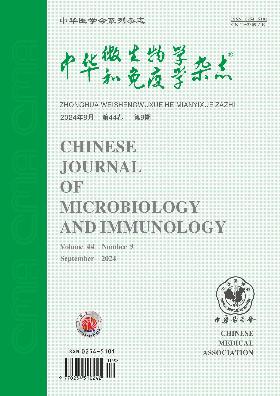登革病毒4型Ban18HK20减毒活毒株感染性克隆的构建、鉴定及稳定性分析
Q4 Immunology and Microbiology
引用次数: 2
摘要
目的构建稳定的登革热减毒病毒(DENV) 4型Ban18HK20株感染克隆,为进一步了解DENV毒力决定因素和促进嵌合疫苗的研制提供依据。方法根据Ban18HK20株基因组构建特异性引物,对6个cDNA片段进行亚克隆,并将其连接到高拷贝质粒pSPTM中,获得稳定的DENV全长cDNA克隆。在体外从全长cDNA中转录RNA并电转染到Vero细胞中以恢复病毒。采用菌斑法、间接免疫荧光法、生长动力学试验和小鼠脑致病性研究等方法鉴定病毒的生物学特性。采用RT-PCR扩增技术对病毒传代15代的遗传稳定性进行了研究。结果限制性内切酶酶切和测序分析表明,成功构建了感染性克隆。恢复的病毒在斑块形态、DENV E蛋白表达、生长特征和小鼠脑致病性方面与亲本病毒一致。测序分析表明,该病毒与亲本病毒基因组序列相同,具有良好的遗传稳定性。结论构建了Ban18HK20的稳定感染克隆,建立了DENV研究的反向遗传技术平台。关键词:登革病毒;反向遗传学;感染性克隆;病毒复苏本文章由计算机程序翻译,如有差异,请以英文原文为准。
Construction, characterization and stability analysis of infectious clone of live attenuated dengue virus type 4 Ban18HK20 strain
Objective
To construct a stable infectious clone of live attenuated dengue virus (DENV) type 4 Ban18HK20 strain for better understanding the virulence determinants of DENV and improving the development of chimeric vaccines.
Methods
Specific primers were constructed according to the genome of Ban18HK20 strain and used to subclone six cDNA fragments, which were linked into a high-copy plasmid pSPTM to obtain a stable full-length cDNA clone of DENV. RNA was transcribed from the full-length cDNA in vitro and electrotransfected into Vero cells to recover the virus. Biological characteristics of the recovered virus were identified using plaque assay, indirect immunofluorescence assay, growth kinetics test and pathogenicity study in mouse brain. Genetic stability of the virus passaged 15 generations was studied using RT-PCR amplification.
Results
Restriction enzyme digestion and sequencing analysis indicated that the infectious clone was constructed successfully. The recovered virus was consistent with the parental virus in terms of plaque morphology, DENV E protein expression, growth characteristics and pathogenicity in mouse brain. Sequencing analysis showed that the recovered virus had the same genome sequence as the parental virus with good hereditary stability.
Conclusions
A stable infection clone of Ban18HK20 was constructed and a reverse genetics technology platform for DENV research was established.
Key words:
Dengue virus; Reverse genetics; Infectious clone; Virus recovery
求助全文
通过发布文献求助,成功后即可免费获取论文全文。
去求助
来源期刊

中华微生物学和免疫学杂志
Immunology and Microbiology-Virology
CiteScore
0.50
自引率
0.00%
发文量
6906
期刊介绍:
Chinese Journal of Microbiology and Immunology established in 1981. It is one of the series of journal sponsored by Chinese Medical Association. The aim of this journal is to spread and exchange the scientific achievements and practical experience in order to promote the development of medical microbiology and immunology. Its main contents comprise academic thesis, brief reports, reviews, summaries, news of meetings, book reviews and trends of home and abroad in this field. The distinguishing feature of the journal is to give the priority to the reports on the research of basic theory, and take account of the reports on clinical and practical skills.
 求助内容:
求助内容: 应助结果提醒方式:
应助结果提醒方式:


